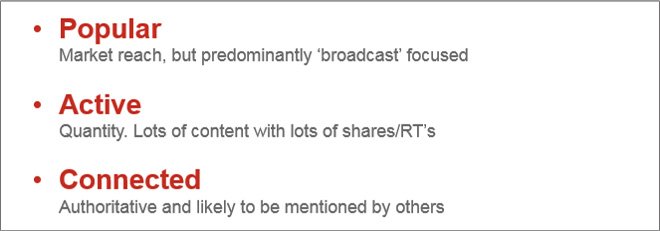May 7, 2015
In the event of Klout’s new feature to identify expertise, and the fact that I seem to be increasingly talking more and more to clients around this subject, I thought it seemed timely to discuss influencers.
Firstly, what is Klout’s new feature? Well, in a nutshell, it shows you what subjects users are ‘experts’ in – or should I say, what subject Klout deems them to be experts in. I say this because I was, apparently, an expert in Fitness Training, Bodybuilding, Digital Marketing (so far so good)…and London (hmmm?) having spoken to colleagues, they seem to have London as an expertise as well. Clearly, this is an indication of how the algorithm works (given that we are based in London). Whilst it is a fair assumption that I am pretty au fait with the city I live in, I do not often find myself frequenting bars introducing myself to people as a ‘London expert’.
According to Rob Tarkoff, President and CEO of Lithium + Klout:
“These new features make Klout more meaningful for more people than ever before and reintroduce context and trust back into everyone’s online experience, our power Klout users and those with high Klout Scores will be publicly visible for the expertise they have built over the years on topics they are passionate about.”
Whilst the algorithm probably needs finessing, the main principle of this feature is good and allows you to easily identify those that are experts in a particular field. Plus, you can edit your expert subjects to make it more accurate. In summary, a fun and handy feature.
Now that we’ve got that out of the way, it is worth asking yourself “Is Klout actually any good for measuring influence?” In an influencer marketing report conducted by Augure last year, 61% of marketers claimed that identifying a true influencer remained their largest challenge in influencer marketing. Coupled with that, only 9% said that they see Klout being a valid criteria for defining influence.
When I speak to clients, I generally define influencers as being one or a combination of the following things:

Augure have their own take on the key metrics that they measure to define influence. These are basically quite standard metrics but taken in context of the subject matter that you are looking to gain influence over. They are, as follows:
- Echo:the ability to get people to take action
- Exposition:the potential for audience exposure
- Share of voice:or the influencers level of activity in the conversation
I would argue that you could map these more concisely:
- Echo = relevant engagement
- Exposition = relevant impressions/reach/following
- Share of voice = share of the relevant conversation
And marketers buy into these metrics as true influencer identifiers:
- 79% believe an influencer should have echo
- 73% believe an influencer should have exposition
- 62% believe an influencer should have high share of voice
I actually believe that this is great way to make metrics relevant and measure true influence specific to the audience and conversations important to your goals.
However, to bring it back to Klout and how I began this blog, influencer marketing is like a piece of string. You can take it as far as you like, but it is best to conduct it within reason to achieve your business goals. If influencers are fundamental to achieving your objectives, then an advanced, engaging influencer programme is necessary. But for those testing the waters or using it to find key people for content sharing, then Klout, with its new feature, still does a nice job of helping us easily locate key people.
